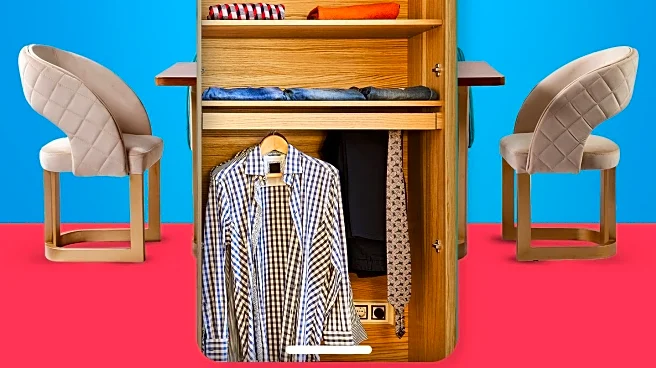What's Happening?
The concept of 'elevated basics' is gaining traction as a transformative approach to personal style. Elevated basics refer to high-quality foundational wardrobe pieces such as tees, socks, sweaters, and
work bags. These items, though simple, are crafted with superior materials and design, offering longevity and versatility. The idea is that investing in these basics can enhance overall style, allowing for a polished look even with minimal effort. The article explores various elevated basics, including white tees, button-down shirts, blazers, dress pants, cashmere sweaters, socks, loafers, and work bags, highlighting their impact on wardrobe transformation.
Why It's Important?
Investing in elevated basics can significantly impact personal style and wardrobe functionality. High-quality basics offer durability and versatility, allowing individuals to create a variety of looks with fewer pieces. This approach challenges the notion that style is defined by bold, statement items, suggesting that subtlety and quality can equally elevate one's appearance. For consumers, this means potentially reducing waste and promoting sustainable fashion practices by choosing long-lasting items over fast fashion. The shift towards elevated basics reflects broader trends in consumer behavior, emphasizing quality and sustainability.
What's Next?
As the trend of elevated basics continues to grow, fashion brands may increasingly focus on producing high-quality, versatile pieces that appeal to consumers seeking longevity and style. This could lead to a shift in marketing strategies, highlighting the benefits of investing in quality over quantity. Consumers may also become more discerning in their purchasing decisions, prioritizing items that offer both style and sustainability. The fashion industry may see a rise in demand for ethically produced and durable basics, influencing production practices and brand offerings.
Beyond the Headlines
The emphasis on elevated basics reflects a cultural shift towards minimalism and sustainability in fashion. This trend challenges traditional consumerism, encouraging individuals to value quality and longevity over frequent consumption. It also highlights the importance of personal style as a form of self-expression, where subtlety and craftsmanship are appreciated. As consumers become more aware of the environmental impact of fashion, the demand for sustainable and ethical production practices may increase, driving industry-wide changes.









